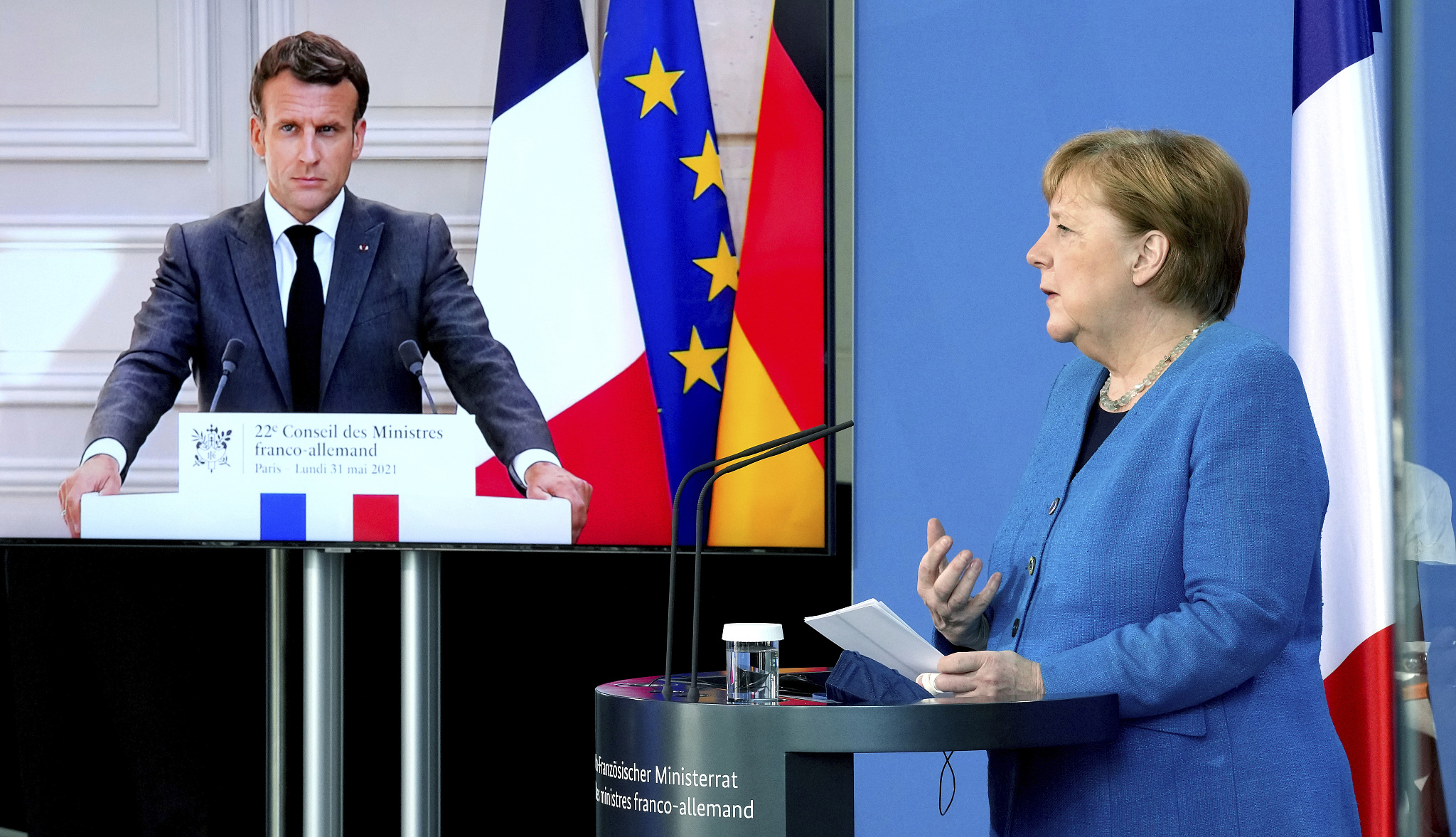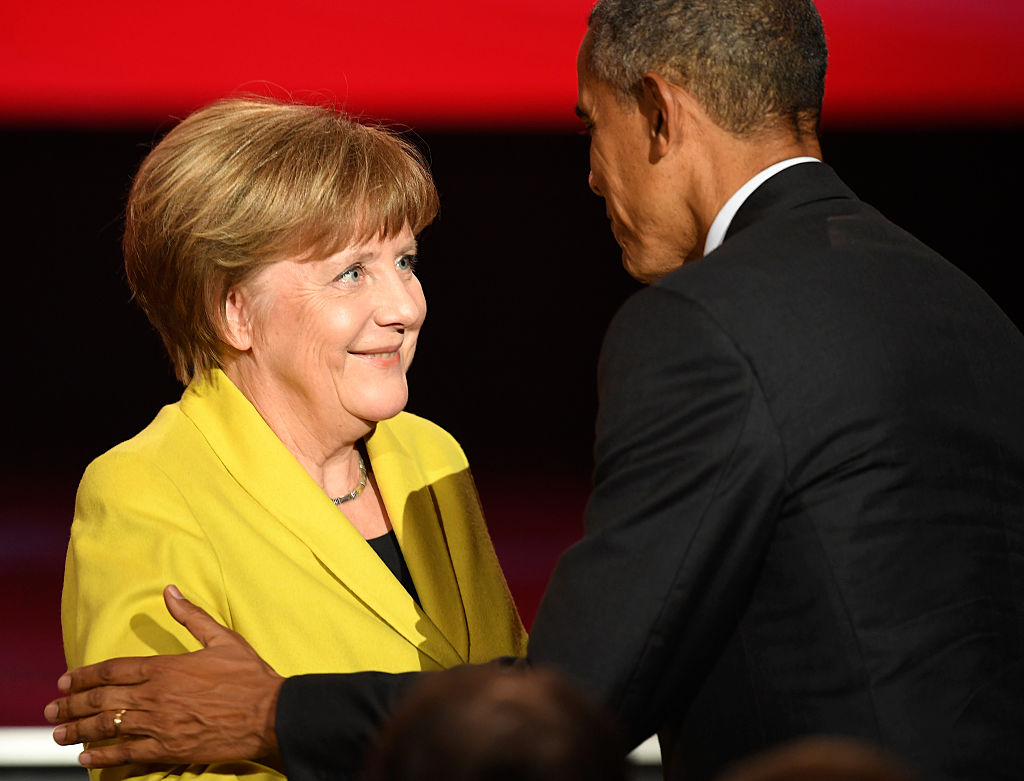
French President Emmanuel Macron is seen on a video screen during a joint press conference with German Chancellor Angela Merkel (R) as part of a virtual Plenary Session of the Franco-German Council of Ministers in Berlin, Germany, May 31, 2021. /VCG
French President Emmanuel Macron is seen on a video screen during a joint press conference with German Chancellor Angela Merkel (R) as part of a virtual Plenary Session of the Franco-German Council of Ministers in Berlin, Germany, May 31, 2021. /VCG
Editor's note: Bradley Blankenship is a Prague-based American journalist, political analyst and freelance reporter. The article reflects the author's opinions and not necessarily the views of CGTN.
A recent Danish media report suggests that the Danish Defence Intelligence Service (FE) had been working in collaboration with the U.S. National Security Agency (NSA) to spy on top European leaders, including German Chancellor Angela Merkel. While this is not particularly surprising since the U.S. was caught spying in Germany in 2014 and U.S. intelligence was reported to have collaborated with their Danish counterparts in the past, it still speaks volumes about the relationship between the two sides.
Those relations are undoubtedly shaky regardless of these revelations after a difficult four years under former U.S. President Donald Trump, who abdicated American leadership in international institutions and abandoned any pretext of multilateralism.
President Joe Biden has tried to reverse course for transatlantic relations by saying that "America is back," meaning that Biden and his team want to restore America's prestige on the world stage by engaging more in multilateral institutions, taking a more active role in global affairs and generally fostering a sense of trust among allies. While this might seem like a new development, it's actually not.
In fact, former president Barack Obama, who Biden served under as vice president, tried to do the same thing after his predecessor, George W. Bush left office. The U.S.' blatant overreaction in the so-called "War on Terror" and subsequent invasions of Iraq and Afghanistan destroyed America's global credibility, especially in Europe where those countries that followed in America's unilateral wars – the so-called coalition of the willing – saw rising incidences of terror and growing public mistrust.

Then U.S. President Barack Obama greets German Chancellor Angela Merkel at the opening evening of the Hannover Messe trade fair in Hanover, Germany, April 24, 2016. /Getty
Then U.S. President Barack Obama greets German Chancellor Angela Merkel at the opening evening of the Hannover Messe trade fair in Hanover, Germany, April 24, 2016. /Getty
Transatlantic relations, and it could even be said the prevailing global order, were on the ropes. Barack Obama came into office and tried to return America's credibility by engaging more in multilateral efforts; fostering dialogue with perceived adversaries like Cuba, Iran, China and Russia; and engaging in symbolic acts that undercut toxic American exceptionalism, like shaking hands then-Cuban leader Raul Castro at Nelson Mandela's funeral and honoring the victims of the atomic bomb in Hiroshima.
Through Obama's gestures and concrete geopolitical maneuvers, the U.S. had managed to hold together a teetering global order under its leadership. America, as it could be said, "was back" after the shameful Bush years. In fact, according to various accounts, Obama was highly respected in Europe and considered Angela Merkel his closest ally and a personal friend. He even won the 2009 Nobel Peace Prize for "his extraordinary efforts to strengthen international diplomacy and cooperation between peoples."
This is precisely what makes the allegations of the NSA spying on European leaders so damning. Because it didn't happen during the Trump years when relations between the EU and the U.S. were at a low, rather between the years 2012 and 2014 when Obama was president and when the U.S. and Europe were trying to navigate, presumably as equal partners, difficult situations such as the Ukraine crisis.
Put simply, these allegations show that the U.S., even when headed by leadership that espouses multilateralism and diplomacy, does not see Europe as a partner but rather as a geopolitical pawn; even when "America is back," America is always first – and there's nothing to suggest that would ever change.
Sure, this was almost a decade ago and under a different president, but, according to whistleblower Edward Snowden, Biden was "deeply involved in this scandal the first time around." At the same time, Biden's actions as president thus far – vaccine nationalism, for one obvious example – do not show any severe break from the status quo that suggests the U.S. has the EU's interests in mind.
These allegations should not be overlooked by European leaders and need to be fully investigated. Moving forward, the EU should demand reciprocity from the U.S. and put an end to undue American influence that undermines the EU's stated foreign policy objective of strategic autonomy. Without stern action and clear boundaries, the U.S. will continue to undermine European independence through its surveillance programs against member states.
(If you want to contribute and have specific expertise, please contact us at opinions@cgtn.com.)

